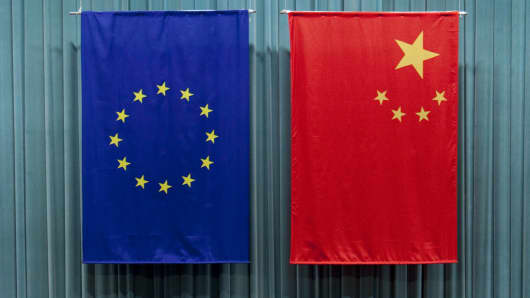By Huileng Tan

The European Union has a vested interest in promoting technology exchanges with China, but any transfers should be regulated, said the trade bloc's ambassador to China on Wednesday.
"For the last 40 years, EU companies have provided most of the foreign tech that is in China, about 50 percent of what is today in China," said Nicolas Chapuis, ambassador of the EU delegation to China.
However, the diplomat expressed concerns about China trading market access for technology.
Beijing forces foreign companies to hand over their technological know-how in exchange for access to its massive domestic market.
The administration of U.S. President Donald Trump has demanded that China cease forced tech transfers, which have become a flashpoint in the U.S.-China trade war.
"This has to stop or to be regulated," Chapuis told CNBC at the European Chamber Annual Conference 2018 in Beijing.
"Of course if a company wants to open its tech books to a Chinese company — all right, that's not an issue, but it has to be regulated so that there is no so-called 'forced tech transfer,'" Chapuis said.
Beijing has claimed it will step up protection of intellectual property rights, but experts point out that China wields its state-controlled legal system to take whatever trade secrets it wants for its own companies.
Chapuis said he is confident that China will be able to keep to its reform plans, but Beijing needs to ensure a consistent and unified countrywide approach to enforcing these regulations.
"This has to stop or to be regulated," Chapuis told CNBC at the European Chamber Annual Conference 2018 in Beijing.
"Of course if a company wants to open its tech books to a Chinese company — all right, that's not an issue, but it has to be regulated so that there is no so-called 'forced tech transfer,'" Chapuis said.
Beijing has claimed it will step up protection of intellectual property rights, but experts point out that China wields its state-controlled legal system to take whatever trade secrets it wants for its own companies.
Chapuis said he is confident that China will be able to keep to its reform plans, but Beijing needs to ensure a consistent and unified countrywide approach to enforcing these regulations.
He said he was optimistic that the plans will eventually play out as Beijing knows that such reforms are crucial to future growth.
The EU envoy also said that the EU is supportive of all foreign direct investments that will benefit the region.
"We believe in an open economy, we believe in globalization, but we need to make sure that these investments are conducive to growth, and not be a way to capture technology and to close down factories," Chapuis said.
"What we want are long-term investment strategies that create jobs (and) growth. We also have to take into account the criticism of globalization, which is growing in Europe as elsewhere in the world."
"So we need to make sure that this money flowing into Europe is perceived as a good thing and not as a bad thing," he added.
The EU envoy also said that the EU is supportive of all foreign direct investments that will benefit the region.
"We believe in an open economy, we believe in globalization, but we need to make sure that these investments are conducive to growth, and not be a way to capture technology and to close down factories," Chapuis said.
"What we want are long-term investment strategies that create jobs (and) growth. We also have to take into account the criticism of globalization, which is growing in Europe as elsewhere in the world."
"So we need to make sure that this money flowing into Europe is perceived as a good thing and not as a bad thing," he added.
Aucun commentaire:
Enregistrer un commentaire